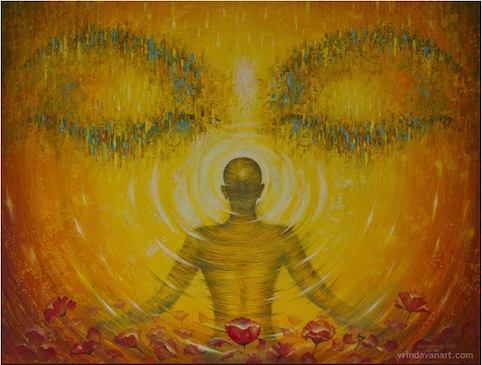‘D’ expresses ‘light’ as seen within ‘deva’ meaning that which comes from ( va ) from the light ( d ) as seen within ‘dipa’ meaning the purifying ( p ) effects of light ( d ) as seen within ‘Da’ meaning to ‘give’ as in the action ( a ) of light ( d ) and as seen within ‘dhi’ meaning ‘knowledge’ as in the light within.
‘V’ expresses ‘separation’ as seen in the name of the sage ‘vyasa’ who separated the one Veda into four, his name meaning he who places ( asa ) apart ( vy ). ‘D’ meaning ‘light’ and ‘V’ meaning ‘separation’ becomes ‘dva’ and ‘dvi’ meaning ‘two’ as in that which separates ( vi ) from the light ( d ) as in the one becoming two.
‘Dva’ meaning ‘two’ becomes ‘dvaita’ meaning ‘two’ as in ‘duality’ a philosophy which recognises the existence of spirit and matter, a duality which creates all other dualities such as ‘near and far’ ‘birth and death’ ‘young and old’. ‘Dva’ meaning ‘two’ becomes ‘advaita’ meaning non ( a ) dual ( dvaita ) as in ‘one’ a philosophy which recognises that the duality of this world is an illusion, the ultimate reality being spirit, pure consciousness from which matter is generated.
Dvi meaning ‘two’ becomes ‘Dvipa’ meaning ‘island’ as in that which has water ( ap ) on both sides ( dvi ) and we find this in ‘Svetadvipa’ meaning the white ( sveta ) island ( dvipa ) and ‘Navadvipa’ the nine ( nava ) islands ( dvipa ) all of which are found upon the Ganges in Mayapur.
Dvipa meaning ‘island’ corrupts into the Hindi ‘doab’ meaning ‘island’ as in surrounded on both sides ( do ) by water ( ab ) and this becomes the European ‘duber’ meaning ‘double bank’ the Celtic ‘dubras’ meaning ‘waters’ the Anglo Saxon ‘dofer’ meaning ‘waters’ and from this we get the shiny white cliffs of Dover which was once surrounded on both sides by water.
‘Dvi’ and ‘Dva’ meaning ‘two’ becomes the standard European word for ‘two’ as seen within the languages of Belarussia, Bulgaria, Serbia, Bosnia, Croatia, Russia, Czec, Slovenia, Slovak, Polish, Ukraine, Swedish, all having ‘Dva’ as their word for ‘two’ and reflecting how once we were part of a shared culture.
‘Doubting’ is to be in ‘two minds’ and the source of this ‘doubt’ is the Sanskrit ‘dva’ meaning ‘two’ which becomes the European ‘duo’ meaning ‘two’ which then becomes ‘doubt’ meaning one who is in ‘two minds’ and which also gives us the word ‘dubious’.
Dvi meaning ‘two’ becomes ‘dvipad’ meaning ‘two footed’ and this becomes ‘biped’ a word from Europe meaning an animal with ‘two feet’ and the ‘ped” meaning ‘foot’ is also the Sanskrit ‘pada’ meaning ‘foot’ and we also have ‘bicycle’ meaning ‘two wheeled’.
A contrast between two things is known as a ‘dichotomy’ its source being the Sanskrit ‘dva’ which becomes the European ‘dvi’ which becomes the Latin ‘dis’ which becomes ‘dicha’ meaning ‘two’ and ‘dichotomy’ meaning ‘a contrast between two things’.
To ‘discard’ means to ‘separate’ to ‘distill’ means to ‘separate’ and to ‘distinguish’ means to ‘separate’ all having as their root ‘dis’ a word from Latin meaning to ‘separate’ its source being ‘dvi’ and ‘dva’ words from Sanskrit meaning ‘two’ and we find some 1700 words bearing this prefix ‘dis’ whose meaning is to ‘separate’.
The letter ‘D’ and the letter ‘T’ are known to interchange within languages being phonetically similar, and so ‘dva’ meaning ‘two’ becomes the Old English ‘twa’ the Proto Germanic ‘twa’ the Anglo Saxon ‘twa’ and eventually the word ‘two’ whose origin is ‘dva’ a word from the language of Sanskrit meaning ‘two’.
“It is the ancient Indian culture that has regarded the science of numbers as the noblest of its arts. A thousand years ahead of Europeans the Indians knew that the zero and infinity were mutually inverse notions”. The Universal history of numbers by Georges Ifrah.



